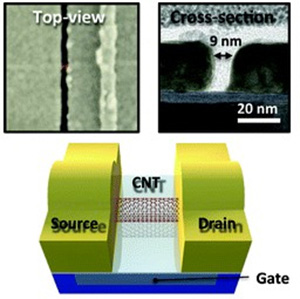IBM Uses Carbon Nanotubes To Create 9nm Tansistors
IBM’s researchers have developed the world’s smallest carbon nanotube transistor, that is just 9 nanometers (nm) across. The presumed physical limit of silicon transistors in comparison is 10nm across, with the smallest production grade silicon transistors currently being 22nm. The carbon nanotube transistor itself apparently consumes less power and is able to carry more current than any of today’s current technology according to IBM. The results themselves also highlight the value of carbon nanotubes in the case of today’s sophisticated transistors. The success of 9nm carbon nanotube transistors could potentially extend the life of today’s conventional electronics, as it breaks past the 10nm limit of silicon transistors. There are some complications, however: manufacturing large batches of carbon nanotubes that function as semiconductors is proving extremely difficult. There is a need for better methods of producing pure batches of semiconducting nanotubes as well as finding better ways to place large numbers of nanotubes on a surface with perfect alignment.

“The results really highlight the value of nanotubes in the most sophisticated type of transistors,” says John Rogers, professor of materials science at the University of Illinois at Urbana-Champaign. “They suggest, very clearly, that nanotubes have the potential for doing something truly competitive with, or complementary to, silicon.”

Comments are closed.